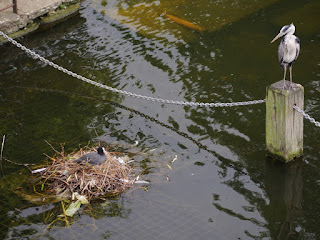... which was quite hard to swallow ...
... but the chick got it down in the end.
Thanks to Bluebird Boats for a ride to the island to photograph them.
Coots with chicks often distribute food to each other to make it easier to feed the whole brood.
At the bridge, a Grey Heron was staring at the nesting Coot wondering when its chicks would be ready to eat.
The Black Swan arrived to join a group of feeding Mute Swans, surprising some visitors who didn't know that swans could be black. He pecked another swan out of the way, but then the local bully sailed over and chased him off.
The rafts of water plants at the east end of the Serpentine provide a varied diet for Greylag Geese.
A young Great Tit was feeding itself, pecking little larvae off infested leaves.
It had probably seen its parents doing this, so it knew that the brown spots contained something edible.
This is one of the many Wrens that live in the Dell and the adjacent patch of scrub at the east end of the Serpentine.
Two Reed Warblers were flying around in the reed bed at the Diana fountain.
The female Little Owl at the leafy yard was on the branch above her hole, staring balefully ...
... at a Jay in the front of the chestnut tree.
A Red Admiral butterfly perched for a moment on a leaf beside the Long Water.











If I get up early enough tomorrow, I should be able to snatch some time in the park before meeting someone off the train at Paddington. I
ReplyDeletehope I can find the handsome Black Swan
Judging by his behaviour over the past few days, he will probably be quite near the Serpentine island, on either side. Good luck.
DeleteHow graceful does the Black Swan look! He is even more beautiful in the video than in the pictures. The White Swans look clunky by comparison.
ReplyDeleteI have just found this link in the BBC and I am flabbergasted (viewer's discretion adviced):
http://www.bbc.com/news/science-environment-40445379
It appears juvenile wild mallards eat migratory birds. It just makes no sense to me. Is this the end of times?
A bit macabre but not really surprising. Mallards eat insects and shellfish as a matter of course.
Delete